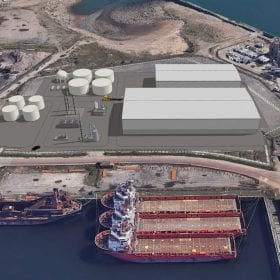“The investors may remain hesitant, but when “Big Oil” redirects its industrial and organisational strengths towards renewable energy, the outcome will be impressive.”
Today we sit down with Maria Moræus Hanssen, one of Norway’s best-known former oil, gas and energy executives who is now heading up the management team behind Wastefront, an exciting company brining circular principles (and technology) to the business of tyre waste recycling. Founded in Oslo in 2019 Wastefront, converts disused tyres into useful commodities, including liquid hydrocarbons and carbon black, which can then be reutilised in processes such as alternative fuel or ground rubber manufacturing and Maria can tell us more…
Luke Upton (LU): Thanks for the time today. Your career began with a traditional energy company, how has your career led to working with the circular economy?
Maria Moræus Hanssen (MMH) – ( @MariaMoraeusH ) I have spent more than 30 years in the oil and gas industry in a variety of different roles. I have been a reservoir engineer, an investment director, an offshore installation manager and a CEO. My engagement with Wastefront today is all about making the fossil energy industry circular. By recycling end of life tyres (ELT) we create valuable products for second generation / second cycle fuels or, even better, products that can be reused for tyre manufacturing, or by the petrochemical industry. I do feel this is a very natural next step in the energy transition.
LU: Considering your experience, in your opinion can companies that are still dominated by the harvesting of fossil-fuels truly change to reflect changing societal and customer demands.
MMH: Absolutely. Look at the impressive strategic turn-around happening with BP. The investors may remain hesitant, but when “Big Oil” redirects its industrial and organisational strengths towards renewable energy, the outcome will be impressive.
LU: Looking at your role as Chairperson of the Board at Wastefront, why has the company chosen to focus on disused tyres?
MMH: Creating a circular industry or economy based on end-of-life-tyres is an important element in making the transportation sector more sustainable. Increasingly, vehicles may run on electrical or hydrogen-based power, but tyres are still tyres, and a disruptive technological alternative does not yet exist (nor do we appear close to finding one). ELT waste is a significant global issue and being a (partial) solution to this challenge represents a real business opportunity for us.
LU: Can you tell us a little more about the processes and technologies the company deploys?
MMH: Our process is based on pyrolysis, which is the process of chemically decomposing organic materials at elevated temperatures in the absence of oxygen. The process takes place under pressure. We have two main output streams from the pyrolysis generators: liquid products which can be distilled into Naphtha, Kerosene and bunker oil, and solids which can be further refined into (recovered) Carbon Black. It is important to understand that the goal is to capture and recycle the carbon, and as we do not introduce oxygen, CO2 is not generated as part of the core process. This is what differentiates waste-to-products processes and plants from waste-to-energy processes and plants.
LU: You’ve recently announced the construction of ‘UK’s greenest waste tyre recycling plant’ in Sunderland (see main picture). What’s taken you to the NE of England and the timeline and specifics of the plant?
MMH: The UK is a global centre of industry which we want to be a part of, while Sunderland is the ideal geographical location for our first plant due to its ready access to feedstock, strong local support and its rich history as an industrial city.
The full-scale plant in Sunderland will have a daily capacity to process 180 tonnes of ELT waste, and convert it into useful commodities, including liquid hydrocarbons and carbon black. The construction of the plant is expected to generate around 100 jobs in the region and, once fully up and running in 2023, the plant will employ up to 60 people full time.
LU: And finally, as we always like to ask our interviewees, what’s your favourite sustainable / biobased product and why?
MMH: This is an interesting question. I would say Recovered Carbon Black. Recovered Carbon Black will be competing with Virgin Carbon Black as the key input and ingredient in manufacturing recycled tyres. Recovered Carbon Black currently trades at a discount to Virgin Carbon Black but over time, I hope to see this ratio turned on its head. If we, as a supplier, or as an industry, can consistently supply high quality Recovered Carbon Black to tyre manufacturers, I believe they will prefer our product due to the sustainability aspect.
LU: Thank you very much, we look forward to being kept updated with the development of the project.







